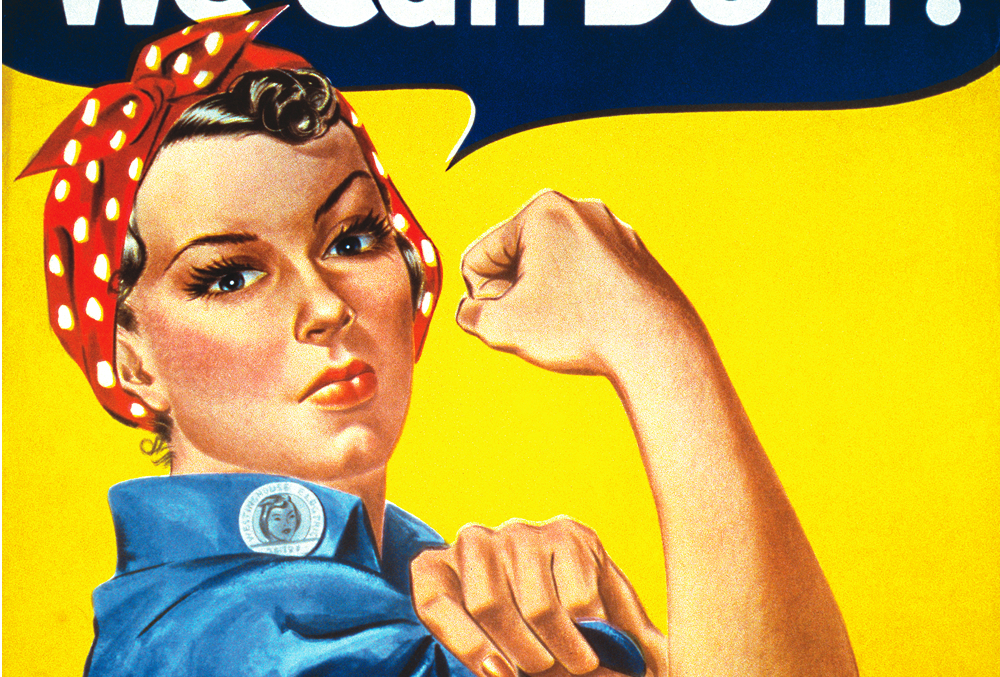Happy Women’s Equality Day!
Today we recognise the 47th annual celebration of female suffrage in the USA, a day in which Americans will celebrate the 19th Amendment. Granted in 1920, this provided that “the right of citizens of the United States to vote shall not be denied or abridged by the United States or by any State on account of sex.” It was a victory for women – well, for some women.
Women of colour were excluded from the right and barred from voting; it wasn’t until 1965 that a true right to vote was implemented.
But today in our celebration of womanhood and equality, we might consider that feminism still has a long way to go – and our diets might be a necessary factor in attaining true equality.

Articles claiming that “to be feminist is to be vegan” have previously sparked controversy: eating meat and dairy surely cannot render someone who believes in equality between the sexes to be unfeminist. Being a meat-eater doesn’t make you an avid supporter of the patriarchy, a Trump fanatic, a woman beater, does it?
Perhaps not, but looking at the relationship between feminism and veganism can help us figure out if rather than merely female human equality day, we should instead strive to celebrate female earthling equality day.
Women’s Equality Day: What’s it Got to Do with Veganism?
- The animal agriculture industry depends on the exploitation of female reproductive systems. For example, dairy cows experience an enforced repetitive cycle of insemination, pregnancy and birthing. A cow is subjected to this because she is female and humans seek to reap the benefits of her body.
- Many in the feminist movement might be interested to learn that the equipment used to restrain cows and pigs while they are artificially inseminated is known as a ‘rape-rack.’ Even on small-scale farms, inseminators invade the animal’s body by shoving their arm up her rectum, to push on the cervix, while inseminating her with the other hand – obviously against her will. This is not to necessarily place this on the same level as human sexual abuse, but it should be questioned whether we feel comfortable and justified in imposing this invasion on these clearly vulnerable creatures.

- For those of you who have seen Simon Amstell’s Carnage: Swallowing the Past you will recall a scene where men become so desperate for mammals’ milk after the UK stops producing dairy that human women begin selling their own breast milk on the streets. The parallel between this and prostitution – an undeniably patriarchal and damaging abuse of the female body – is made clear despite Carnage’s comedic overtones. It might be worth considering: if you wouldn’t want strangers taking your own breast milk from you, should you be doing it to another mammal?
- Also ironically, Carnage highlights how sexualised yoghurt sales have become – apparently Nicole Scherzinger moaning over a pot of yoghurt is the best way to sell a product made from exploiting a cow’s reproductive system (and I’m sure Scherzinger’s ‘role’ as the ditsy erotically-charged female has endlessly helped the feminist cause asking for women to stop being objectified…).

- We celebrate Mother’s Day in recognition of the bond between human mother and child, while ignoring that these same bonds exist in species other than our own. Peaceful Prairie Sanctuary has a description of the experience of mothering as it happens for millions of cows every year: “Some try to fight off the attackers, some try to shield their babies with their own bodies, some chase frantically after the transport, some cry pitifully, some withdraw in silent despair. Some go trustingly with their keepers only to return to an empty stall. They all beg for their babies in language that requires no translation.”
- There exists a ‘linked-oppression’ argument: human and non-human females are often objectified more so than their male counterparts. Traditionally, both are thought of as tied to nature and to their bodies more so than their minds. Chickens are valuable for their reproductive eggs; dairy cows are valuable for their milk; even in the pet breeding industry, for every stud male there will be many more ‘breeding females’. We have created a system which positions female animals, by virtue of their female-qualities, in a more vulnerable position than males. This is comparable to the sexualisation and disfavouring of women that we see in human relationships. One difference is that while humans can fight for their rights, female animals cannot.

- The meat industry has even fuelled gender stereotypes and sexism among humans. A Guardian article titled Why do normal men turn sexist when they get in front of a barbecue? read “[a] biologically deterministic blizzard of bulls**t sees men as the keepers of the grill and women as mere salad-spinners.” The bizarre idea that meat is manly has played its part in furthering the ridiculous distinctions between genders.
You can be a feminist without being vegan, just as you can be a good person while eating meat. The distinctions aren’t exclusive.
The question is how selective you are about your feminism.
Changing your lifestyle to avoid animal cruelty – to avoid the exploitation of females of all species – can only make you more of a feminist. In the same way inter-sectional feminism is critical of “white feminism“, vegan feminists wants us to consider that not only should we fight for the rights of all human women, but we must fight for the rights of females who cannot demand rights for themselves too: animals.

Maybe one day we will be celebrating an even further-reaching equality day.
Image credit: Vice
[/et_pb_text][et_pb_social_media_follow _builder_version=”3.0.53″ saved_tabs=”all” link_shape=”circle” url_new_window=”on” follow_button=”on” background_layout=”light” global_module=”4820″] [et_pb_social_media_follow_network social_network=”facebook” skype_action=”call” url=”https://www.facebook.com/livekindlyco/” bg_color=”#3b5998″]

